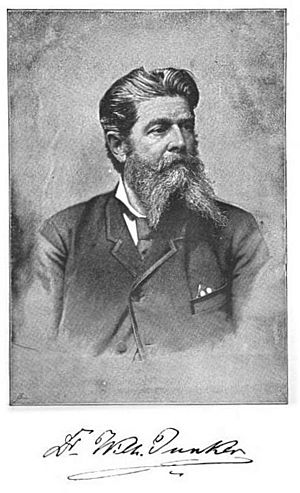Wilhelm Junker facts for kids
Wilhelm Junker (born April 6, 1840, died February 13, 1892) was a brave Russian explorer who traveled a lot in Africa. He was of German background.
Born in Moscow, Wilhelm Junker first studied medicine. He went to universities in places like Dorpat (now called University of Tartu), Göttingen, Berlin, and Prague. But he didn't work as a doctor for very long.
Contents
Exploring New Lands
After his studies, Junker began to travel. He made several short trips. In 1869, he visited Iceland. Then, in 1873, he explored parts of Western Africa. He also went to Tunis in 1874 and Lower Egypt in 1875.
Adventures in Equatorial Africa
From 1875 to 1886, Wilhelm Junker spent almost all his time in eastern Equatorial Africa. He used Khartoum and later Lado as his main bases. From these spots, he started his many expeditions.
Junker was a careful traveler and a great observer. His main goal was to learn about the people he met. He also collected many samples of plants and animals. He wrote down all his findings in a book called Reisen in Afrika. This book was published between 1889 and 1891. It was later translated into English.
Important Discoveries
Wilhelm Junker explored the area where the Nile River and Congo River systems meet. This area is called the Nile-Congo watershed. He also proved that the Welle River and the Ubangi River were actually the same river. This was a very important discovery for understanding the geography of Africa.
Facing Challenges
Junker had planned to return to Europe through Sudan in 1884. However, a big conflict called the Mahdist War made this impossible. His brother tried to send an expedition from St Petersburg in 1885 to reach him, but it failed.
So, Junker decided to travel south instead. He left Wadelai on January 2, 1886. He traveled through Uganda and Tabora. Finally, he reached Zanzibar in November 1886.
Legacy and Recognition
In 1887, Wilhelm Junker received a special award. He got the gold medal from the Royal Geographical Society. This showed how important his work as an explorer was.
Junker is known as a very important explorer. His observations about the Niam-Niam people (also known as the Azande) were especially valuable. He died in St. Petersburg in 1892.
See also
 In Spanish: Wilhelm Junker para niños
In Spanish: Wilhelm Junker para niños
 | Charles R. Drew |
 | Benjamin Banneker |
 | Jane C. Wright |
 | Roger Arliner Young |


